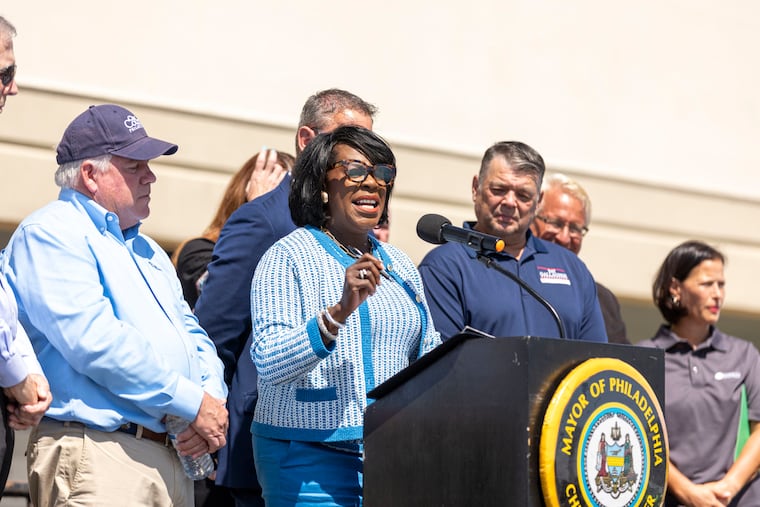Mayor Parker says her summertime cleaning program was a success. Now comes the hard part.
The city plans to repeat the 13-week program again starting later this fall, and will make it a twice-yearly “standard operating procedure” in the future.

In June, new Philadelphia Mayor Cherelle L. Parker gave her administration 13 weeks to clean every block as part of what officials called the largest effort to address quality-of-life issues in the city’s history.
Now, as the summer comes to a close, she’s declaring the program a success — and said the city will do it again.
Parker and top cabinet members said Wednesday that crews cleaned about 18,000 blocks. Their efforts included picking up litter, clearing more than 3,700 vacant lots, sealing 400 abandoned properties, scrubbing more than 2,000 instances of graffiti, and towing away about 2,100 abandoned cars.
Carlton Williams, Parker’s director of clean and green initiatives, said the city plans to repeat the 13-week program starting later this fall, and will make it a twice-yearly “standard operating procedure” in the future.
The program was a key first-year initiative for Parker, who ran for office on a promise to make the city “safer, cleaner, and greener” and vowed to end the “Filthadelphia” moniker that has long plagued the city. She has described cleanliness as a matter of public safety, and said her administration would bolster enforcement of code violations to deter illegal dumpers, nuisance business owners, and more.
» READ MORE: Mayor Parker’s $246 million plan to clean up ‘Filthadelphia’
Officials said they are clear-eyed that a single day of cleaning on each block is not itself adequate. On Wednesday, they unveiled new “Big Belly” trash cans that self-compact — 1,500 of which were funded through Parker’s first budget and will be installed across Philadelphia. That funding will double the number of Big Belly trash cans in the city.
Her administration has also said it will send quality-of-life crews to each of the city’s 10 councilmanic districts, which are geographically based, beginning later this month. Those groups will be responsible for maintenance and responding to periodic reports of litter, illegal dumping, and the like.
Williams said that the administration will announce a pilot program for twice-weekly trash collection later this fall, and that Parker’s “clean and green cabinet” — a task force of people from inside and outside city government — will issue recommendations by the end of the year.
But Parker said maintenance following the summer cleaning program is also up to residents. She said Philadelphians should establish strategies on their blocks “to sustain what [the city] did.”
“When you see our team come through your block,” Parker said, “I hope you are inspired to connect with your neighbors to say, ‘Well, how can we keep going with what the city of Philadelphia did?’”
Despite the Parker administration’s heralding of the program, some who have long studied waste and litter see the “clean every block” strategy as more show than substance. Nic Esposito, the city’s former zero-waste and litter director who left in 2020, said the city must reduce litter and waste by addressing it at its source.
And he said expecting residents to sustain the program is unrealistic — the proliferation of litter, he said, is largely due to systemic issues outside the control of any one block or person. For example, Esposito said, residents in many cases illegally dump their household trash because their landlord doesn’t provide a trash receptacle.
“A lot of people I’ve talked to are saying ‘my block is filthy again,’” said Esposito, now the director of policy and engagement at Circular Philadelphia, a nonprofit focused on waste reduction and economic growth. “Cleaning up something once and then thinking it’s just going to stay clean after that is just absurd.”